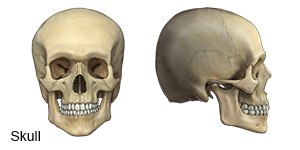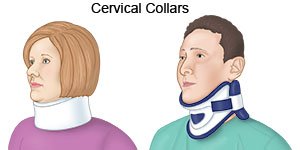Skull Fracture
Medically reviewed by Drugs.com. Last updated on Aug 4, 2025.
AMBULATORY CARE:
A skull fracture
is a break in a bone in your head.
 |
Signs and symptoms
depend on the cause of your skull fracture:
- Headaches, dizziness, or jaw pain
- Nausea or vomiting
- Blood or clear fluid coming out of your nose or one or both of your ears
- Bruising behind your ears or around your eyes
- Misshapen head
- Drooping on one side of your face, or trouble moving one side of your face or closing your eye
- Hearing problems, such as ringing in your ears and hearing loss
- Trouble moving your arms and legs or raising your shoulders
- Neck pain and trouble moving your neck
- Trouble swallowing, dry mouth, or drooling on one side of your mouth
- Uncontrollable eye movements, not being able to move one of your eyes, or blurred or double vision
Call your local emergency number (911 in the US), or have someone else call if:
- You had a seizure.
- You suddenly feel lightheaded and short of breath.
- You have chest pain when you take a deep breath or cough.
- You cough up blood.
Seek care immediately if:
- You have blood or fluid coming out of one or both ears.
- You have worsening neck pain.
- You have eye pain or swelling around your eyes.
- One or both of your eyes begin to bulge.
- Your arm or leg feels warm, tender, and painful. It may look swollen and red.
Related medications
Call your doctor or neurologist if:
- People close to you notice changes in how you act.
- You have a fever.
- You have a headache that does not improve after you take medicine.
- You have ear pain.
- You are vomiting.
- You have questions or concerns about your condition or care.
Treatment
may include any of the following:
- Medicines may be given to prevent or treat a bacterial infection, or to reduce swelling.
- Excess cerebral spinal fluid (CSF) may drained to relieve pressure around your brain. CSF may be sent to a lab for tests.
- A brace may be used to keep you from moving your head and neck. A neck brace may be soft or hard and helps prevent more injury while your fracture heals.

- Surgery may be needed to fix your damaged skull bones or to remove pieces of bone. Pins, plates, or screws may be used to hold the bones together or to keep your spine stable. Injuries to your brain, nerves, or blood vessels may also be treated.
Treatment options
The following list of medications are related to or used in the treatment of this condition.
Activity:
You may need to rest in bed with your head raised for a period of time after your injury. Avoid straining, such as blowing your nose, sneezing, and lifting heavy objects. Straining may increase the pressure in your head. If fluid from around your brain is leaking, straining may worsen the leak.
Rehabilitation
may be needed if you have problems with dizziness. You will learn activities that will help improve your balance and decrease your dizziness.
Follow up with your doctor or neurologist as directed:
Write down your questions so you remember to ask them during your visits.
© Copyright Merative 2025 Information is for End User's use only and may not be sold, redistributed or otherwise used for commercial purposes.
The above information is an educational aid only. It is not intended as medical advice for individual conditions or treatments. Talk to your doctor, nurse or pharmacist before following any medical regimen to see if it is safe and effective for you.
Learn more about Skull Fracture
Treatment options
- Medications for Head Injury
- Medications for Head Injury w/ Intracranial Hemorrhage and Loss of Consciousness
- Medications for Head Injury with Intracranial Hemorrhage
- Medications for Head Injury with Loss of Consciousness
Care guides
Symptoms and treatments
Further information
Always consult your healthcare provider to ensure the information displayed on this page applies to your personal circumstances.
